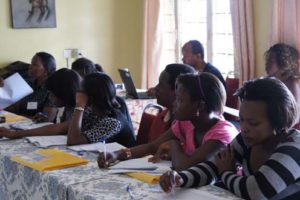WP6 is a randomized-control trial of the impact of agricultural information in Ghana and Uganda. In each country, a baseline survey was carried out and a sub-sample was randomly selected to receive agricultural market information via SMS messages to farmer phones.
In Ghana, farmers have been receiving a variety of information services during 2014. Approximately one-third of the study group has been receiving agricultural prices, extension messages, and weather alerts, another third have been receiving agricultural prices alone, and the remaining third served as the control group.
During the second half of the year, I began to negotiate with the Institute for Statistical and Socio-Economic Research (ISSER) of the University of Ghana at Legon to carry out the endline. The terms of references and contract have been finalized, and it will be processed this month. The endline survey will take place in February–March 2015 and will cover assets, housing, land use, input use, crop production and marketing, storage, livestock, other income, and credit. A new module will focus on the use of and satisfaction with the market information services.

In Uganda, I worked with FIT-Uganda, the information service provider, to address the problem of attrition. After the baseline survey but before FIT-Uganda contacted the selected farmers, the Uganda telecom companies cut off the phone numbers of large numbers of farmers who had not registered their mobile numbers. As result, we were initially only able to locate 48% of the target farmers. During 2014, I worked with FIT-Uganda to carry out a series of steps to find the missing households. We prepared a contract amendment to fund additional search efforts, including recruiting the assistance of village leaders and field visits by FIT-Uganda staff. As a result of these efforts, we increased the share of target households enrolled in the program to 83%. The contract amendment also provided funding to extend the period of information services so that all farmers will receive at least one year of market information before carrying out the endline survey. In addition, FoodAfrica Project Coordinator Mila Sell from MTT visited Washington DC to collaborate on the gender analysis of the Uganda data.
Written by Nicholas Minot, IFPRI
